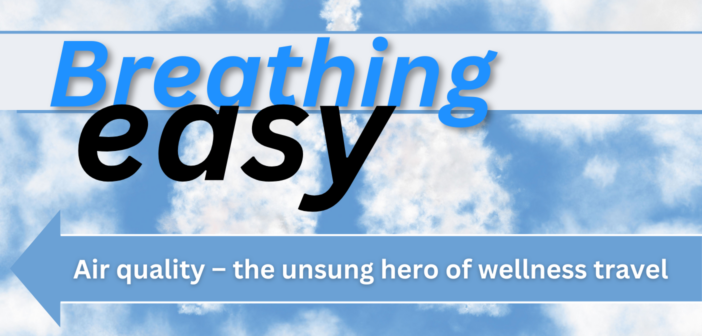Air quality – the unsung hero of wellness travel
Wellness travel means different things for different people – from soul-searching retreats to health-conscious cuisine or even exhilarating outdoor activities. But, one thing most travelers – and hoteliers – might not consider that can make a huge difference is sleep quality, beyond a comfortable mattress or a pillow with the perfect firmness. While wellness initiatives often focus on spa treatments, fitness facilities, and nutritional options, there’s a critical, yet often overlooked, aspect that directly impacts guest satisfaction and wellness: air quality.
BEHOLD THE BENEFITS
Traditionally, outdoor air pollutants like smog, allergens, and smoke have been the primary concern regarding air quality, especially for those with respiratory issues. However, indoor air quality is just as important, sometimes even more so for travelers. Indoor spaces can contain mold spores, bacteria, and even fragrances to scent spaces and can irritate guests. According to the Global Wellness Institute, wellness tourism is the fastest-growing segment in the industry. Increasing wellness offerings, such as improving indoor air quality, can be a gamechanger. It can be particularly advantageous for guests who are hyperaware of their health and well-being, including business travelers who seek a balanced lifestyle when on the road.
Improved air quality does more than just offer a clean breathing environment; it actively enhances guests’ health and wellness experience. Good air quality can lower stress, promote relaxation, and improve sleep. Clean air allows for easier breathing, which helps the body transition into a resting state, making it easier to enter REM sleep because the body can get to a resting state much faster and easier when it’s not trying to fight off foreign air particles. This allows guests to wake up feeling refreshed and rejuvenated. A good night’s sleep can be imperative for travelers who have a big presentation for work the following day, need to take a test in the morning, or are adjusting to a time change. This positive impact on sleep quality is critical for overall wellness during travel for any hotel guests.
A purified room can be life-changing for guests with allergies and asthma. Even those not typically sensitive to allergens may be impacted when traveling. For example, someone who has never been allergic to any flora might still experience an allergic reaction to regional plants, such as cactus flowers in Arizona. Furthermore, the more particles in the air, the higher the chances of those particles carrying harmful viruses or bacteria. Enhanced air quality, therefore, improves comfort and decreases the probability of airborne illnesses among guests. In this post-pandemic era, many people still are hesitant to travel – packing disinfectants is just as front of mind as packing toiletries. Knowing their hotel prioritizes air quality, thereby minimizing the risk of airborne illnesses, guests can enjoy their stay with peace of mind.
WHAT STEPS CAN HOTELIERS TAKE?
As the wellness tourism market continues its upward trajectory, hoteliers are uniquely positioned to elevate their guests’ experience by improving air quality. Educating associates on the topic and continuing the conversation also is important. Train associates to understand the importance of air quality, how to maintain it, and how to communicate its benefits to guests. Well-informed staff can serve as ambassadors for your hotel’s commitment to wellness. They also can continue the conversation with guests and get feedback, allowing hotels to keep improving and staying on top of wellness offerings.
In addition to overall guest satisfaction, offering wellness benefits also can improve a hotel’s bottom line. By investing in better air quality, hotels can market their stay as a premium experience.
THE FUTURE OF WELLNESS TRAVEL
According to Grandview Research, the global wellness tourism market was valued at $814.6 billion in 2022 and is expected to grow at a CAGR of 12.42% from 2023 to 2030. And, while “primary wellness” travel or trips solely for health and wellness continues to grow, there’s also a surge in “secondary wellness” travel. These are trips taken for other reasons, like business or leisure, where guests still engage in wellness offerings like spa treatments or hiking trails. Hoteliers are noticing that guests are increasingly willing to pay a premium for accommodations that promote health and wellness.
It’s not just about plush robes, fine dining, or even a state-of-the-art gym. The air guests breathe arguably is the most fundamental aspect of their stay. When it comes to health and wellness, the goal should be to create rooms so pure that relaxation and sleep come naturally, meeting the wellness needs of every traveler. By recognizing and investing in improved air quality, hoteliers can strongly commit to wellness, fulfilling the increasing demand and setting their properties apart in the thriving wellness tourism market.
Hoteliers can embrace the shift and seize this opportunity for a premium experience by implementing the following four strategies:
- Air-purification systems: Incorporating advanced air-filtration technologies drastically can improve indoor air quality.
- Allergen-free rooms: Consider removing common irritants like feather pillows and offer hypoallergenic options instead. It’s also important to deep clean for dust mites and mold spores.
- Pet-free zones: Pet dander is a common irritant for those with allergies or asthma. If the hotel is pet-friendly, designate a floor or specific rooms where pets aren’t allowed to accommodate guests with pet allergies.
- Limit fragrances: Switch to natural, hypoallergenic scents for lobbies and public areas to avoid irritating guests. Eliminating fragrances in hotel rooms and scented laundry detergents for sheets and towels can make a huge difference for those with allergies or sensitive skin.


 Haley Payne
Haley Payne

